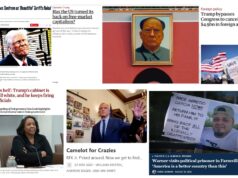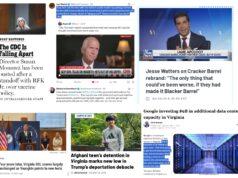
Nevertheless, a brilliant economist on the Faculty of Economics at the University of Cambridge, Ha-Joon Chang, has written for us ordinary folks a highly readable, light-hearted handbook that tells us what is really going on, called 23 Things They Don’t Tell You About Capitalism. Mr. Chang has the chops for this exercise, since he is “one of the world’s most iconoclastic economists, in the tradition of John Kenneth Galbraith and Joseph Stiglitz,” and is the 2003 winner of the Myrdal Prize and the 2005 Leontief Prize for Advancing the Frontiers of Economic Thought.
Chang says up front that 23 Things is not an anti-capitalist manifesto, so relax, what you are reading is not seditious. Mr. Chang points out that “being critical of free market ideology is not the same as being against capitalism,” and that the free market creed is not the only way to organize capitalism—- if our leaders had made different decisions based on better understanding of economics, things would have turned out differently in 2008.
What a relief to hear these sentiments vocalized coherently in public, something I had personally hoped Obama would do, to change the terms of the debate as he tried to repair the disaster. When he did not, but rather brought in top free market acolytes like Summers and Geithner, and doubled down on free market methodology, it did not surprise me that we had a miserably halting “recovery” from the world-wide free market collapse, that is, from the creative destruction of 2008.
Let’s look at a few of the 23 Things. Consider it a cram course in changing the debate when next we face another Faux News brainwashee, or suffer through another iteration of the Republican Ryan Budget.
Thing 1: There is no such thing as a free market. What they tell you: “Markets need to be free… people must be left ‘free to choose’ so that resources flow to their most efficient use” because of those choices, and this results in the greatest profit, raising everybody’s standard of living. Government regulation distorts the market, so people lose the incentive to “invest and innovate.”
What they don’t tell you: The free market does not exist in the real world. There are always rules and regulations that restrict not only the freedom of choice, but who can engage in trading, rules taken so for granted that we do not notice them. Example: many things cannot be traded, such as narcotic drugs, human organs, electoral votes, government jobs, legal decisions, human beings themselves—- they were all once freely traded but nowadays are not, at least not openly.
When child labor laws were first institutedm, free marketeers protested that government regulation interfered with the right of children to work, while reformers were concerned about the freedom of children not to work. When slavery was abolished, slave owners objected that they should be free to own and trade human beings, while reformers worried about the personal freedom of the slaves and the morality of people owning people. I would also add: anti-union “right to work” laws actually restrict the freedom of workers to choose to come together in the market to bargain collectively rather than as isolated individuals.
What about the licensing of professions like doctors, or the production of medicines and pharmaceuticals? The government regulates these markets nowadays to protect its citizens from quackery and poison, and most people are comfortable with that, not having the time much less the expertis to risk their lives over such matters. What about prices, including prices of labor and money? Interestingly, Chang points out that wages in rich countries are determined more by immjigration than by minimum wage laws so hated by free marketeers, and immigration is set by government policy, so that what is a starvation wage in the US is a handsome wage in China (where wages are 10 percent of those in the US) or India (2 percent of US). Interest rates, too, remember, are manipulated by the Federal Reserve as a matter of public policy. Let’s not forget that that great free marketeer, President George W. Bush, implemented not just the natiobnalization of Fannie Mae and Freddie Mac in 2008, but also TARP. Both were bailouts of the financial system by the federal government over protests from free market politicians, but not, be it noted, from actual free market capitalists themselves. Bush explained these two interferences by government in the free market as being a continuation of the American free enterprise system because “the federal government should interfere in the market place only when necessary”—- political doublespeak at its finest.
I would also add that free markets cannot exist because one side of the transaction always has more knowledge or more clout than the other side. It is never a level playing field, so choices are never completely free, nor do people always make choices based solely on their monetary bottom line—- the pure economic man does not exist in real life, yet the free market theory is predicated on such a man.
Describing a “free market” therefore depends upon who is speaking when, and it inevitably ends up being a political definition because government is always involved somehow, and free-marketeers are as politically motivated as anyone else. Fair trade, fair wage, immigration, and so on are debates about moral values and not about economics “in the usual sense,” and, Chang says, such decisions are “not something economists with their technical tool kits are particularly well equipped to rule on.” Economic theory alone, at least free market economics, “cannot tell us what the ‘right’ wages and working conditions should be in China (or anywhere else). We cannot agree on the boundaries of the market, therefore, free market theory is not a science:
“Thus seen…. Saying that an existing regulation should be abolished is saying that the domain of the market should be expanded, which means that those who have money should be given more power in that area, as the market is run on one-dollar-one-vote principle…. So, when free-market economists say that a certain regulation should not be introduced because it would restrict the ‘freedom’ of a certain market, they are merely expressing a political opinion that they reject the rights that are to be defended by the proposed law.”
.
You cannot understand capitalism until you discard the notion of market objectivity, i.e., free markets.
Thing 5: Assume the worst about people and you get the worst. What they tell you: Adam Smith explained that the market “harnesses the energy of selfish individuals thinking only of themselves (and, at most, their families) to produce social harmony… We have to assume the worst about people (that is, they think only of themselves), if we are to construct a durable economic system.” This describes the “mysterious market,” centerpiece of free market theory.
What they don’t tell you: Self-interest is not our only trait, and “is very often not even our primary motivation. Indeed, if the world were full of the self-seeking, greedy individuals found in economics textbooks, it would grind to a halt because we would be spending most of our time cheating, trying to catch the cheaters, and punishing the caught.” Example: Adam Smith assumed that shopkeepers will naturally over-charge, workers will goof off, and professional managers will maximize their own salaries rather than company profits, but in all cases their selfishness will be restrained in the market by competition from other shopkeepers, other workers anxious to replace the goof-offs, and the stock market which ferrets out lower profits and punishes the manager’s company with lower share prices that ultimately cause the manager to be fired. When it comes to career government bureaucrats, they can easily run amok against the public interest because their high job security makes them immune to market forces, so the obvious answer is to shrink the numbers and power of the career government employees, reduce job security through short-term job contracts, and privatize government functions.
However, almost any book or class about business leadership does not advocate leadership by suspicion and punishment. No, it worries about inspiring workers, creating teamwork, and magnifying people’s good side rather than concentrating on their bad side. Successful companies seem most often to be those that, like Toyota, exploit the good will and creativity of their workers by giving them responsibility and “trusting them as moral agents” to do the right thing. Free market economists scoff at moral behavior as an “optical illusion” saying that we do not see “hidden rewards and sanctions” which they claim actually motivated the seemingly moral behavior, things like fearing loss of a good reputation.
Chang says that, in a world populated by totally selfish individuals, the invisible rewards and sanctions simply would not exist because rewarding and punishing others “costs time and energy only to the individuals taking the actions, while their benefits from improved behavioural standards accrue to everyone.” Margaret Thatcher got it wrong when she said “there is no such thing as society. There are individual men and women and there are families,” because human beings are actually all born into societies with certain moral codes which each individual internalizies. We may not be angels, but, whether we realize it or not, we all operate under a moral code which may include, for example, “honesty, self-respect, altruism, love, sympathy, faith, sense of duty, solidarity, loyalty, public-spiritedness, patriotism” as well as that free market selfishness.
When employers treat workers ruthlessly, assuming the worst, employees may “behave” out of fear, but can subtly respond in kind by, for example, “working to the rule” so meticulously they are sabotaging the work process in a kind of semi-strike. No work contract can specify everything, so production can be reduced 30-50 percent by simply working “to the rule.” Any system based on the assumption of total selfishness/greed will result in lower, rather than higher efficiency, rather than mysteriously creating social harmony. Ultimately, without trust, any system, including the free market system, breaks down, as I pointed out in in “Pay It Forward” in buevirginia.us
If we assume the worst about people, we will get the worst out of them; that will not create a durable economic system.
There are 21 other Things, like “4: The washing machine has changed the world more than the internet,” or “19: Despite the fall of communism, we are still living in planned economies,” or “22: Financial markets need to become less, not more, efficient.” We will expore a few more in a later diary.













![Video: VA11 Dem Nominee James Walkinshaw Says “I’m excited to vote in November as well, but we’ve [also] got to be excited to vote on September 9th”](https://bluevirginia.us/wp-content/uploads/2025/08/walknshawwhite-100x75.jpg)
